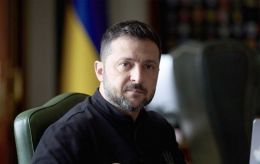Russia likely uses Iranian proxies to counter West - ISW
 Flag of Russia (Illustrative photo: Getty Images)
Flag of Russia (Illustrative photo: Getty Images)
Russia is likely attempting to use Iranian proxies to indirectly confront the West, including in support of Ukraine, according to the American Institute for the Study of War (ISW).
Analysts have recalled a recent article by The Wall Street Journal, which reported on October 7 that Russian arms dealer Viktor Bout, a deputy from the Ulyanovsk region, assisted Russia in reaching an agreement with the Yemeni Houthis.
This deal involves the sale of weapons worth $10 million (in August 2024) amid increasing reports of potential Russian arms supplies to the Houthis and deepening Russia-Iran cooperation.
According to WSJ sources, the initial shipments would primarily consist of AK-74 assault rifles, and the Houthis have also discussed the potential transfer of Kornet antitank missiles and anti-air weapons.
According to sources, it remains unclear whether Bout negotiated the agreement on behalf of the Kremlin or merely with its tacit approval. WSJ noted that the transfer has not yet occurred, and the source of the weapons is still unknown. WSJ also mentioned that shipments could begin as early as October 2024 at the port of Hodeidah, disguised as food supplies.
In response, Bout and Kremlin Spokesperson Dmitry Peskov denied the media reports.
"Russia has reportedly been involved in Iranian-brokered secret talks to transfer Russian Yakhont (P-800 Oniks) anti-ship cruise missiles and other military equipment to the Houthis, but it is unclear whether these transfers have or will occur," added the ISW.
In summary, analysts continue to assess that Russia is likely seeking to use Iranian proxies for indirect confrontation with the West and to shape the Western decision-making process, including regarding support for Ukraine.
"Russia likely aims to leverage Iranian proxies to indirectly confront the West and shape Western decision making, particularly to deter the West from supporting Ukraine over fears of Russian escalation against the West, including escalating in a different theater," the institute concluded.

